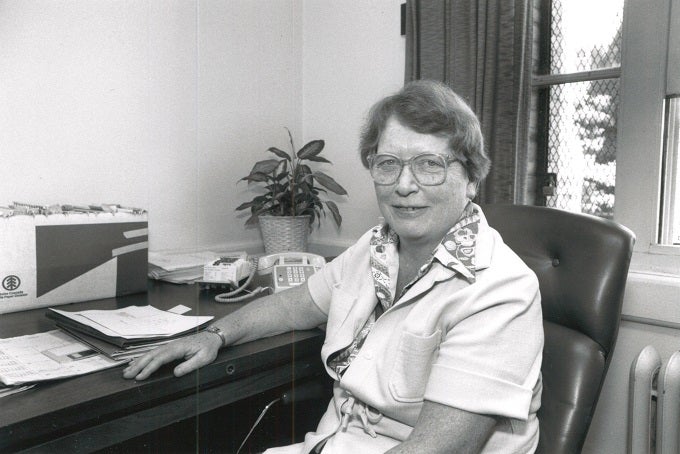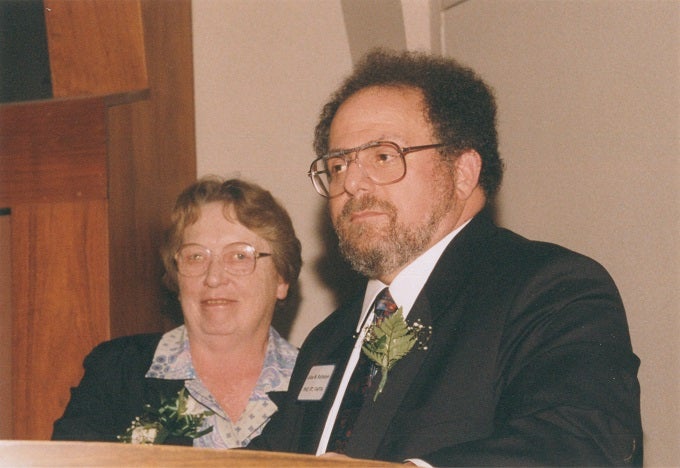
Rosemary Scully, Ed.D, PT, FAPTA, formally associate professor in the Department of Physical Therapy at the University of Pittsburgh, passed away August 7, 2019, in Sun City West, AZ, where she resided after her retirement.
She joined the physical therapy faculty in 1972 and remained until 1992 when she retired. During that time, Dr. Scully served in leadership roles in physical therapy and will be best remembered for her tenure as chair, where she set a foundation for one of the country’s foremost physical therapy educational programs. Dr. Scully worked continuously to enhance physical therapy training at Pitt primarily through her passion for educational excellence.She successfully implemented innovative ways to incorporate clinical experts into entry-level and post-professional educational offerings by convincing the Pittsburgh Veterans Administration and the tertiary care hospital (Presbyterian University Hospital and the Center for Sports Medicine) to create combined clinical/faculty positions between the clinical sites and Pitt. These models proved mutually beneficial by greatly enhancing the educational programs and strengthening clinical learning within the Department of Physical Therapy while providing teaching opportunities to practicing clinicians. In the post-professional arena, she had the foresight to hire two orthopedic experts, Dr. Richard Erhard and Rick Bowling, both of whom put the University of Pittsburgh on the map as one of the best orthopedic post graduate programs in the United States.
Dr. Scully grew up in Weirton, WV, where she developed her love of sports. At 14 years of age, Dr. Scully was one of the youngest women to try out for the women’s baseball league made famous in the movie “A League of their Own.” She was not offered a baseball contract but did go on to earn a degree from West Virginia University in 1957 in physical education. She then completed the one-year physical therapy education program at Columbia University in New York City.
 Dr. Scully worked at Belview in Manhattan and later at Columbia Presbyterian, where she got a taste for education by becoming a supervisor for clinical education. She left New York briefly for a stint at Albany Medical College but was recruited back to NYC to work at Downstate Medical Center in a newly-created physical therapy education program. Finally, Dr. Scully met Pitt’s School of Health Professions’ founding dean, Anne Pascasio, at an American Physical Therapy Association (APTA) district meeting, where she was eventually convinced to return to her hometown region and join the physical therapy faculty at the University of Pittsburgh.
Dr. Scully worked at Belview in Manhattan and later at Columbia Presbyterian, where she got a taste for education by becoming a supervisor for clinical education. She left New York briefly for a stint at Albany Medical College but was recruited back to NYC to work at Downstate Medical Center in a newly-created physical therapy education program. Finally, Dr. Scully met Pitt’s School of Health Professions’ founding dean, Anne Pascasio, at an American Physical Therapy Association (APTA) district meeting, where she was eventually convinced to return to her hometown region and join the physical therapy faculty at the University of Pittsburgh.
Dr. Scully was an expert in clinical learning. She studied the physical therapist-patient interaction in her doctoral work and consulted extensively as an educator. She co-authored a book entitled Physical Therapy and published several papers about physical therapy education.
She served as the vice speaker of the House of Delegates and was an active APTA member. Dr. Scully was a Lucy Blair Service Award winner and a Catherine Worthingham Fellow, recognizing outstanding achievement in practice, research or teaching. The award is the second highest given by the APTA.
Dr. Scully was not only known for her physical therapy expertise and mentorship, but she was also a great sports fan. She loved all things sports but especially the Pittsburgh Panthers. She and her mother could often be found watching a baseball or football game on TV or playing with their amazing dog, Boomer.
The Endowed Scully Visiting Scholar Program at the University of Pittsburgh was developed after Dr. Scully’s retirement to honor her mother and father. She felt that it was important to promote the excellence of the Department of Physical Therapy at the University of Pittsburgh by inviting distinguished scholars to give a lecture and to meet with students and faculty for open forums and discussions. Over the last 23 years, the program has brought the best and brightest physical therapists to Western PA to provide a provocative lecture to the local physical therapy community which was the vision of Dr. Scully.
